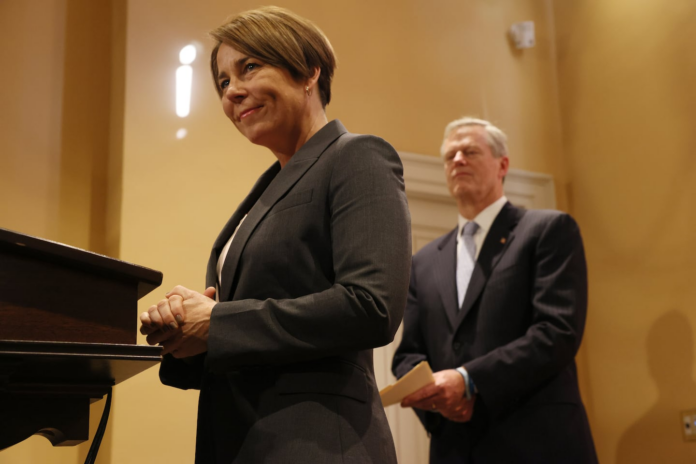Federal labor officials agreed to reduce the principal owed by Massachusetts from $2.5 billion to $2 billion, which would be paid out by the trust fund with equal payments spread out over 10 years, according to terms announced on Monday by the Healey administration. The US Labor officials also agreed to lower the back interest owed, from $487 million to $73 million, and fully waived $120 million in penalties. In total, the Healey administration said, the bill to the federal government would have exceeded $3 billion without this settlement.
The Healey administration has reached a deal with the US Department of Labor to resolve a $2.5 billion liability that the state’s Unemployment Insurance Trust Fund owed to the federal government , related to the improper use of federal relief funds to cover certain jobless claims.
The agreement was signed on Friday, on one of the last days of the Biden administration.
Lauren Jones, Governor Maura Healey’s labor secretary, said there would be no immediate change to employers’ bills as a result of these $203 million annual payments. That’s because the rates that employers pay to support the trust fund are already going up this year from last year, and will go up again next year, a reflection of the fact that more money came out of the fund than went into it in 2024.
Matthew Gorzkowicz, Healey’s administration and finance secretary, said the interest payments to the federal government will come out of the state’s general fund, not the employer-supported unemployment trust fund. There will be additional interest to be paid in future years of the deal, though the Healey administration did not provide an exact amount.
The big bill stems back to an audit conducted in the first months of the Healey administration, in 2023, that uncovered the $2.5 billion error, related to improper payments using federal pandemic unemployment assistance dating back to 2020, during the Baker administration.
Healey has asked Jones and Gorzkowicz to conduct a comprehensive review of the UI program’s solvency and suggest potential reforms. The administration will work with business and labor organizations as part of that review. Jones said the UI fund currently has slightly more than $2 billion, and is projected to run out of money by the end of 2027, even with the rate increases.
Advertisement
In a prepared statement on Monday, Healey expressed both frustration and optimism about the situation.
“We were dismayed to uncover early on in our term that the previous administration misspent billions of dollars in federal relief funds and that our state was facing what could have been a more than $3 billion tab to pay it back,” Healey said. “For the past year and a half, we have engaged in extensive negotiations with the U.S. Department of Labor to minimize the impact on Massachusetts residents, businesses and our economy. … It is incredibly frustrating that the prior administration allowed this to happen, but we are going to use this as a moment to come together with the business and labor community to make meaningful reforms to the Unemployment Insurance system.”
If there’s a silver lining for the business community, it’s the possibility that the state’s UI system could undergo a major overhaul. Business organizations have complained for years about the state’s UI benefits, considered among the most generous in the country as measured by how long someone needs to work at an employer to qualify, the number of weeks that people can collect payments after losing their jobs, as well as the maximum size of the weekly payment.
Jon Hurst, president of the Retailers Association of Massachusetts, noted that employers are already getting hit with a surcharge to cover the cost of $2.7 billion in bonds issued by the state to help prop up the fund in 2022.
“It’s discouraging we have to pay for this,” Hurst said of the latest settlement. “The fact that we have what is frankly a collapsing system even without this additional $2.1 billion, and adding to the fact we’re still paying the $2.7 billion from the prior administration, and now this, all for claims [related to pandemic-era mandatory shutdowns] that were really the government’s fault, not the employers’ fault, it’s a tough thing, it’s very costly.”
Advertisement
On the plus side, Hurst said he’s hopeful “that it appears there’s some willingness to talk about reforming the system. … Maybe this will be a tradeoff that employers will see as worthwhile.”
Reforming the UI system, he said, is crucial to the state’s economic competitiveness.
“You can’t say we want the new generation of entrepreneurs … to locate in Massachusetts,” Hurst said, “if we don’t fix the UI system.”
Jon Chesto can be reached at jon.chesto@globe.com. Follow him @jonchesto.




